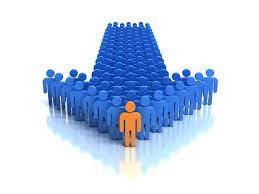For whatever reason, I’ve been wondering lately who’s in charge, or, to put it another way, who is the leader. If a space alien gave me the cliché, “Take me to your leader,” I’m not sure who I would take him to.

Many years ago, one of my college instructors defined a leader as someone who had followers. More recently, I came across the book Bad Leadership, which argued that many “leaders” were bad at their jobs because they were ineffective, meaning they couldn’t get others to buy into their vision or the direction they wanted to take their organization. In other words, no one was following them. (The book also argued that some leaders were bad because they did have followers, but they led the followers to make really bad decisions. Think Jonestown.)
I am becoming more and more aware of how many people call themselves “leaders” (or, even more pretentiously, “thought leaders”). Usually this is a gimmick to make themselves sound more important than they are, hoping that it will attract more attention on social media or more attendees at their online events. These people usually recycle other people’s ideas in new packaging, or they rely on novelty more than substance to keep their “followers” interested in what they are doing.
All this has led me to wonder who our real leaders are, or who should be the leaders. In one of these columns about 18 months ago I mentioned a work group in the Native American community trying to deal with the opioid and homelessness epidemic. The group is doing some fabulous work and making progress, but they lack the resources to get the situation under control. That group is leading the way on Native American issues, but a lack of followers among various government agencies (the people with the resources) is hampering their work.
The Phillips neighborhood hosts many of the largest homeless encampments, was disproportionately affected by the unrest after George Floyd’s death, fights chronic crime problems (including drug dealing and prostitution), and is historically one of the poorer neighborhoods in the city. Despite these challenges, many residents and business owners take responsibility for beautifying the streets, ensuring city funds are spent wisely, and keeping their neighbors informed of local events.
I know there are many leaders that I haven’t noticed or don’t get to meet. I wish these true leaders got more press and could attract enough followers to really make the positive differences they are striving for. The world would certainly be a poorer place without them, but it would also be a much richer place if they are able to truly become our leaders.
by Marti Maltby, Director Peace House Community – A Place to Belong
This article originally appeared in “The Alley,” the newspaper for the Phillips neighborhood of Minneapolis.